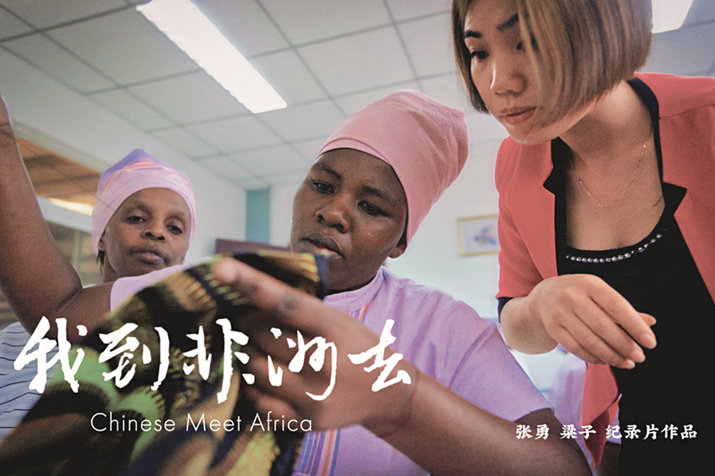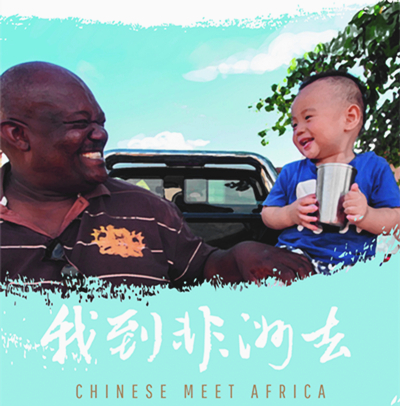By Li Xiaoyu 丨2023-01-29

The poster of the documentary Chinese Meet Africa
Love in Africa, a nonprofit run by Chinese mothers residing in Zimbabwe, was founded by Peng Yan. This nonprofit organisation started helping a number of needy orphanages in 2014 and has since generously supported them. In addition to giving in-kind donations, the Chinese mothers also raise money to cover the orphans’ school expenses and offer them emotional support.
The documentary Chinese Meet Africa, first released in August 2022, features 15 main characters, including Peng. In the first episode, the audience follows Peng’s footsteps to visit Lizzy Ngarawa, a teenager of a children’s home who now regards this Chinese mother as one of her own. Four years ago, when Ngarawa was struggling with expensive treatment for her eye disease, it was Peng who arranged the surgery, enabling her to regain her eyesight. When the teenager saw Peng, she couldn’t contain her emotion and immediately hugged the benefactor. Many viewers were moved by this touching scene. For them, the film highlighted the real relationship between the Chinese and African peoples.
Sizeable presence
Director Zhang Yong, who is also a researcher with the College of Media and International Culture, Zhejiang University, has been eager to share the other side of the human interactions, namely the presence of Chinese people on the African continent, after directing Africans in Yiwu in 2016, a documentary that throws light on the life of Africans in China. He is convinced by the significance and need of his decision.
“Over a million Chinese people have relocated to Africa to live, learn, and work. These folks are ambitious and diligent, and their stories should be preserved,” he told ChinAfrica.
However, he regrets that most of the films that deal with this topic are Western productions, such as The Chinese Are Coming and When China Met Africa, which he claims have a tendency to oversimplify certain problems in order to highlight China’s unfavourable reputation in Africa. “Not only do Chinese audiences not like such portrayals, but African audiences do not subscribe to this kind of view either,” he said. “In my films, I like to pay special attention to the diversity and complexity of Sino-African cooperation. Such collaboration is not one-dimensional, and I think we should take a cautious attitude or even resist any attempt to simplify things into stereotypes.”
He used “multiple themes, multiple characters, and multiple episodes” strategy to achieve this end. The series Chinese Meet Africa, which lasts more than two hours and is divided into five episodes, each with a different theme, covers a wide variety of topics in the everyday life of Chinese in Africa, from entrepreneurship to charitable activities, art, and social life. The integration of Chinese nationals into the society and their sense of belonging there, as well as their private and professional lives and their return to the motherland, are some of the important problems that are explored in the series.
Compared to Africans in Yiwu, Zhang has enriched the audio-visual creation in his new documentary by adding ground, aerial and underwater shots. In an effort to provide viewers a complete image of Chinese people living in Africa, his team shot in 12 different countries. He spoke with a couple engaged in the logistics industry in Angola, for instance, to observe the country’s urban and industrial development; he spoke with a nurse who has followed her father’s lead by joining the Chinese medical mission in Mali; and he met an entrepreneur in Zhejiang Province who is promoting African culture after returning from South Africa.
Zhang had to hire film crews in Africa to capture part of the material remotely due to COVID-19 restrictions. He had to expend a lot of work on stakeholder cooperation. When this co-production was released for the first time at the opening ceremony of the Fifth Forum on China-Africa Media Cooperation, it was hailed as a fresh example of Sino-African cinema and television cooperation.
Co-director and cinematographer Liang Zi, whose book I Love Africa is well known to Chinese readers, also contributed some of the images with material she has accumulated over more than a decade on the continent. “I feel honoured to be able to work with Liang. She has been very diligent, especially in the preparatory phase of the film, which would not have taken place without her participation,” said Zhang.

The poster of the documentary Chinese Meet Africa
A touch of humanity
Zhang has been conducting study on African television and film since receiving his Ph.D. from Beijing Film Academy in 2015. He believes that documentary film is the best medium to promote mutual understanding between Chinese and African peoples. His documentaries, including Africans in Yiwu, Chinese Meet Africa, TAZARA: A Journey Without an End, and Bobby’s Factory, all focus on Sino-African relations. He has visited the continent more than 10 times over his career.
He generally centres his works on the “small characters.” Even when documenting the mega infrastructure project of Tazara, his team did not interview many political leaders or high-ranking officials. “I prefer to let ordinary people tell their own stories to bring a human touch to my films. Also, we rarely use voice-over narration, as we don’t want to speak on behalf of our characters,” said the director.
This tactic works. Li Keqiong, a Zhejiang-based Chinese viewer, was struck by the film’s objectivity. “Each character is genuine and does not try to cover up the murky details, such as their first fear of the unknown in Africa or the effect the local economic downturn had on their business,” Li said. She had not imagined such depth of Sino-African cooperation. “It exceeds my wildest expectations.”
The documentary is already available on Tencent Video, CGTN’s documentary channel and the Rwandan website africachinareview.com. This year, Zhang wants to expand the distribution of his film to additional African networks. Far from slowing down, he is presently working on a new project that will this time focus on the Chinese and African Generation Z.

